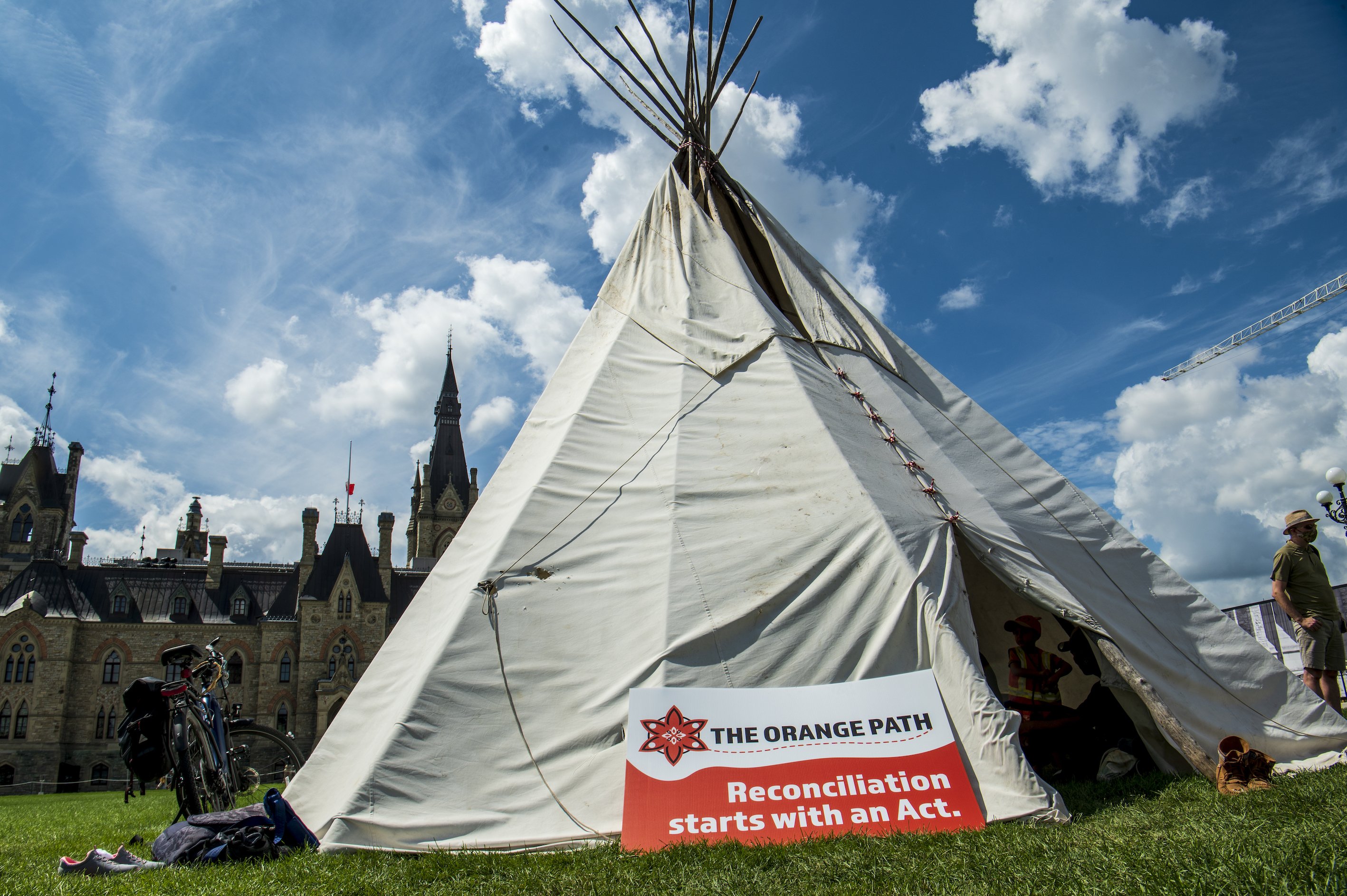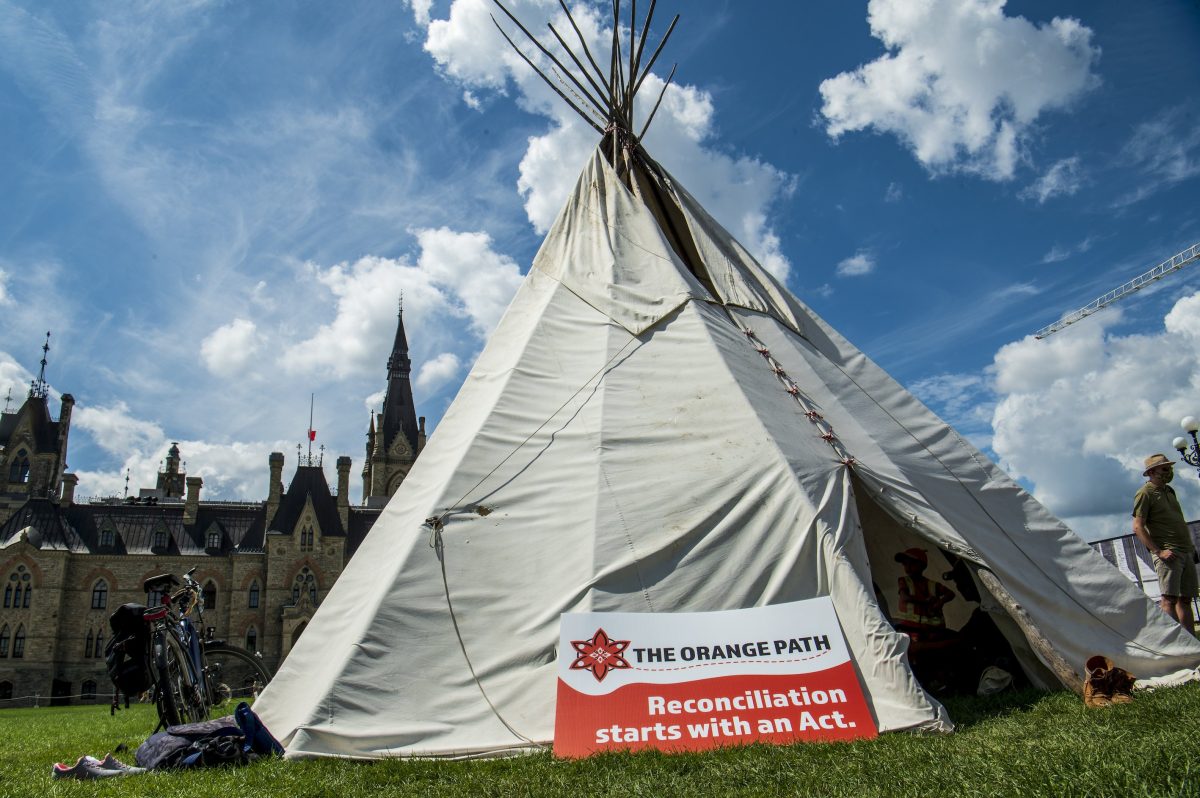
Indigenous people in the U.S. and Canada had mixed reactions to the Vatican’s repudiation of the Doctrine of Discovery, a series of 15th-century papal bulls that legitimized colonial exploitation, but they agreed the statement should be followed with further action.
Marie-Anne Day Walker-Pelletier, a former chief of the Okanese First Nation who represented Saskatchewan residential school survivors on a visit with Pope Francis at the Vatican in March 2022, told NCR she finally felt listened to after trying for years to get the Catholic Church « to really understand and appreciate the pain and suffering that we went through throughout the many hundreds of years. »
Maka Black Elk, a citizen of the Oglala Lakota Nation who is Catholic, said: « It is still only a step, but it’s a step in the right direction. »
On March 30, the Dicasteries for Culture and Education and for Promoting Integral Human Development released a joint statement that declared that the Catholic Church « repudiates those concepts that fail to recognize the inherent human rights of indigenous peoples, including what has become known as the legal and political ‘doctrine of discovery.’ «
The 15th-century papal bulls have been cited at the U.S. Supreme Court, starting in a unanimous decision in 1823 where Justice John Marshall wrote « that the principle of discovery gave European nations an absolute right to New World lands. »
As recently as 2005, Justice Ruth Bader Ginsberg cited the « doctrine of discovery » in denying the Oneida Indian Nation in Central New York the right to tribal sovereignty in repurchased ancestral lands.
While the Vatican statement refers to the « doctrine of discovery » as a « legal concept, » Cora Voyageur, a member of the Athabasca Chipewyan First Nation and a professor of sociology at the University of Calgary, said that the concept « spilled over into the political, the social, the cultural, economic aspects of Indigenous life of people all around the world. »
Steven Newcomb, who is Shawnee/Lenape and author of the 2008 book Pagans in the Promised Land: Decoding the Doctrine of Christian Discovery, said that the Vatican statement is « woefully inadequate. »
« All they have are the titles of those three documents [forming the Doctrine of Discovery], but they don’t tell you what’s in the documents, » he said.
The Vatican statement quotes from the 1537 papal bull Sublimis Deus, where Pope Paul III defended the liberty and property rights of Indigenous peoples. But the statement does not quote from the three 15th-century papal bulls that are cited as forming the Doctrine of Discovery, which explicitly endorse the domination of Indigenous peoples and the Portuguese slave trade of Africans.
The 1452 papal bull Dum Diversas gave Pope Nicholas V’s blessing « to capture, vanquish, and subdue the Saracens, pagans, and other enemies of Christ and put them into perpetual slavery and to take all their possession and their property. »
For Voyageur and others, the Vatican statement’s claim that « the contents of these documents were manipulated for political purposes by competing colonial powers » sidesteps the church’s responsibility.
Mark Charles, a Navajo theologian and the author of the 2019 book Unsettling Truths: The Ongoing, Dehumanizing Legacy of the Doctrine of Discovery, said that Inter Caetera, a 1493 papal bull granting Spain certain land in the Americas, was written after Christopher Columbus’ first voyage, « basically justifying what had already taken place. »
« It’s not that their words and the papal bulls were being manipulated and co-opted by political entities, they were being written for political entities to justify these actions, » Charles said.
Charles sees the Vatican statement as « very clearly trying to limit » the Catholic Church’s legal liability, especially by framing past harms as perpetrated by individual bad actors instead of by church institutions.
When Francis visited Canada in July 2022, Indigenous Canadians called on him to reject the Doctrine of Discovery. In a press conference on his flight home after the visit, the pope said the church’s treatment of Indigenous peoples in Canada amounted to a « genocide, » but also appeared confused about the doctrine itself.
« There’s a view from the shore looking out at those invading ships coming toward our ancestors, and then a view from the ship, » said Newcomb, who has met multiple times with Vatican officials, including one with Francis, urging them to appropriately address the consequences of the papal bulls.
« They want to see their own history and the history of their institution probably in the best, most favorable light, » he said.
Black Elk described the process of producing the Vatican statement as « clearly very deeply thought about. » He cited Jesuit superior general Fr. Arturo Sosa’s visit to Red Cloud Indian School, a former boarding school run by Jesuits, in August 2022, where Black Elk is executive director for truth and healing.
Black Elk said Sosa took two letters to Francis from the Rosebud Sioux Tribe and the Oglala Sioux Tribe calling on the pope to rescind the Doctrine of Discovery and that Sosa wrote in September that he had shared the letters with Francis and talked with him about his personal feelings on the necessity of repudiating the Doctrine of Discovery.
Black Elk said that he « felt comforted that the truth and healing work that we’re doing here at Red Cloud might have played a small role in helping [the repudiation] along. »
« I see this as being another step in a very long journey to heal that relationship because there were harms done, » said Voyageur, a survivor of Holy Angels residential school.
Voyageur called on Catholics to support efforts to revitalize Indigenous languages and to respect Indigenous spirituality. Indigenous people experience continuing traumas from the Doctrine of Discovery, such as families who still do not know the location of the remains of their family members who died in residential schools and those who are dealing with the effects of clergy sexual abuse.
« All the churches that betrayed First Nations, and including the government, they need to come together, they need to sit at the same table and they need to put the actions in place, » said Walker-Pelletier, speaking about language revitalization and workplace equity.
« And we have to be at the table too, » she said. « They’re not going to be planning without us anymore. »
Black Elk said that a key next step for the Vatican would be engaging with Indigenous communities who have asked for items in the Vatican Museums to be repatriated.
He also said that the Vatican should support U.S. and Canadian bishops doing local healing work, pointing to a 2021 letter from Archbishop Paul Coakley of Oklahoma City and Bishop James Wall of Gallup, New Mexico, to all U.S. bishops about forming relationships with Indigenous communities as a starting place.
Advertisement
Newcomb said that if the Catholic Church is going to take responsibility for the Doctrine of Discovery, the church must consider the land it holds.
« Throughout the entire Western hemisphere and probably in other areas of the world where this doctrine of domination was taken, [the Catholic church has] possession of those lands on the basis of those very documents that they say have no value for them, » Newcomb said.
Newcomb said that domination, rather than discovery, is the problem with the series of papal bulls and their long-lasting influence. « How is it and why is it that the claim of a right of domination has been made into the organizing principle of the planet? »
